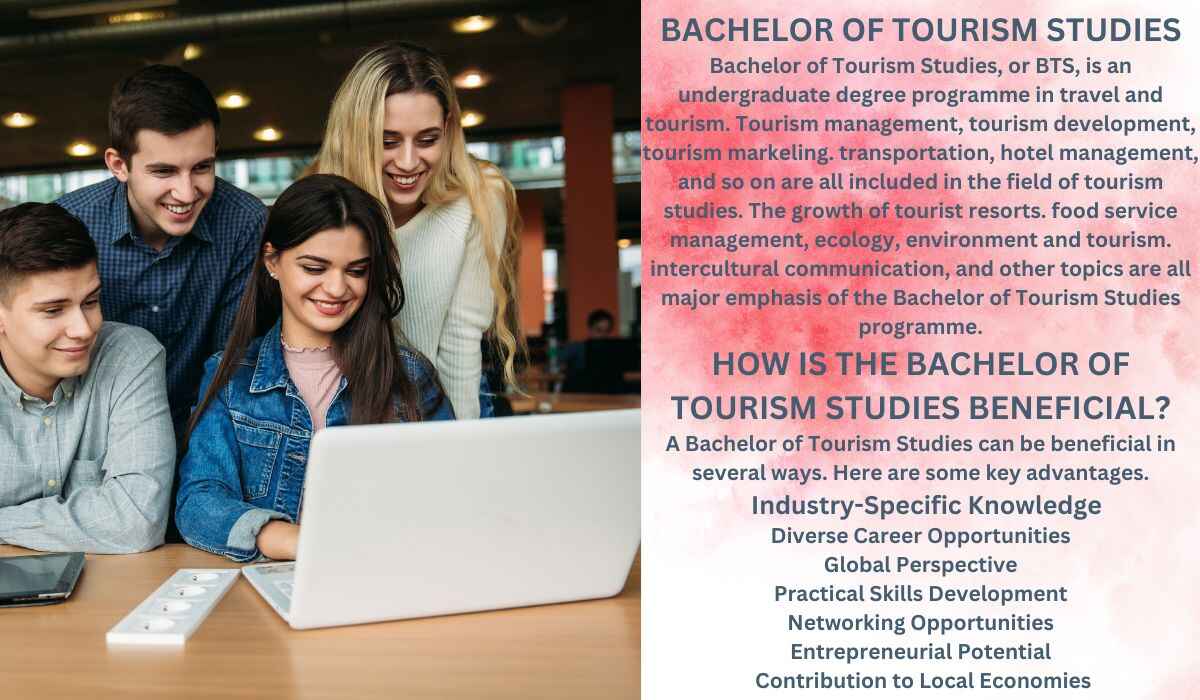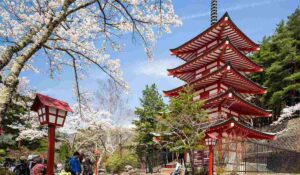Bachelor of Tourism Studies is an undergraduate degree focused on preparing students for careers in the vibrant tourism industry. As international travel continues growing globally, diverse opportunities are opening in sectors like accommodations, attractions, events, and destination marketing.
A tourism studies program provides broad exposure to business areas supporting the visitor economy. Core subjects often include hospitality, transportation, tourism management, and planning recreational activities. Students also gain technical skills in digital marketing, finance, and analyzeing trends.
This well-rounded education allows graduates to pursue rewarding entry-level roles ranging from tour guide to event coordinator to hotel front desk agent. The versatile training also serves those aiming to eventually own tourism enterprises or climb corporate management ladders.
What is Bachelor of Tourism Studies subject?
Tourism Management
Tourism Management is usually a foundational subject area, equipping students with knowledge of operations, marketing, customer service, and management principles in tourism-related organizations.
Specific topics may include sustainable tourism development, event and destination planning, financial management, and the use of technology in tourism businesses.
Hospitality Management
Underpinning tourism is the hospitality sector. Subjects here examine operations and guest experiences across accommodation providers like hotels, resorts, serviced apartments, and more.
Students learn aspects of food and beverage, housekeeping, front office procedures, and hospitality service culture.
Events Management
From conferences to sporting competitions to cultural festivals, events tourism is a large niche. Events Management courses cover concepts like project management, logistics, risk assessment, budgeting, and the economic impacts of events.
Digital Marketing
In the modern tourism landscape, an online presence and strategic digital marketing are essential. Subjects equip students to develop websites, implement search and social media strategies, and analyse emerging online trends.
Statistics and Research Methods
Data is critical for effective business decisions and tourism planning. Subjects teach quantitative and qualitative techniques like surveys, forecasting models, data analysis, and report writing skills.
Destination Planning
Students gain an understanding of developing and managing attractions, festivals, infrastructure, and ecosystems to enhance visitor appeal and experiences in destinations.
Tourism Geography
Topics explore global, regional, and domestic tourism flows and how geographical factors influence travel trends, routes, activities, and economic impacts in destinations worldwide.
Tourism Law and Policy
Laws and regulations shape many aspects of tourism operations and land use. The curriculum covers compliance issues and the policymaking process at all levels of government with implications for the industry.
While course selections may vary slightly between universities, these represent common academic disciplines that provide graduates with expertise across various functions within the multifaceted tourism sector. The mixed-subject approach offers versatile professional preparation.
What is Bachelor of Tourism Studies scope?
- It provides diverse career options in sectors like accommodations, attractions, events, transportation, and destination marketing worldwide.
- Graduates can pursue management roles or use their skills to launch their tourism-related business ventures.
- International tourism is a major growth industry expected to create many job opportunities in the coming decades.
- Courses in areas like marketing and events apply to careers in adjacent fields such as arts, recreation, and non profits.
- The degree allows mobility to work in tourism hubs globally and is not limited to just local prospects after graduation.
Career Paths for Bachelor of Tourism Studies Graduates
Graduates of a bachelor’s in tourism studies can pursue numerous career options thanks to their versatile skill set and broad industry understanding. Some paths include:
- Tour operators – Tour operators organize and run sightseeing tours. With knowledge of attractions, transportation, and customer service, tourism graduates can plan itineraries and lead various touring experiences.
- Destination marketing organizations – These industry representatives promote regions to visitors. Tourism degrees qualify graduates to analyse markets, conduct research, and implement promotions for destinations.
- Event coordinators – Event coordination utilizes skills in logistics, partnerships, budgeting, and more. Graduates can organize sporting competitions, trade shows, conferences, and various meetings & conventions.
- Travel agents – Either independently or for travel companies, agents use their product and destination expertise to customize trip plans for leisure and business travellers.
- Hotel management – From the front desk to upper management, hotels provide opportunities to oversee guest service quality, day-to-day operations, and the development of hospitality properties.
- Attractions supervisors – Museums, aquariums, amusement parks, and more are all potential employers for graduates capable of managing daily needs and programs at visitor destinations.
This wide breadth of options allows tourism degree holders to pursue diverse pathways matching their various interests within the expansive tourism industry.
Is a Bachelor of Tourism Studies Right for Me?
If you enjoy traveling and interacting with people from around the world, a tourism degree may be well-suited for your career aspirations and personality traits. Successful professionals in this field commonly exhibit qualities like:
- Excellent communication skills – The ability to converse effectively with customers, co-workers, vendors, and more is invaluable in tourism-facing roles.
- Adaptability – As visitor interests change and new technologies emerge, modern tourism professionals need to roll with trends and embrace developing skill sets.
- Curiosity about other cultures – An appreciation for global diversity fosters connecting with varied audiences and tailoring experiences.
- Organizational prowess – From event logistics to hospitality management, tourism frequently relies on strategic planning and multitasking abilities.
- Enjoyment of travel – While not mandatory, having an interest in exploring new places in turn inspires cultivating pathways for others’ adventures.
If developing a career dealing with these attributes excites you, then studying tourism at the Bachelor’s level may deliver a strong foundation for succeeding in this industry. Just ensure any program provides ample opportunities to network with industry professionals to best determine which specific career path fits your talents.
Bachelor Of Tourism Studies Salary
Here are some key points about the salary potential with a Bachelor’s degree in Tourism Studies:
- Entry Level Salaries: Graduates typically start around $30,000-$40,000 per year in positions like tour guides, hotel front desk agents, or administrative roles.
- Mid-Career Earnings: Within 5-10 years of experience, salaries often range from $45,000-$70,000 for those in supervisory or specialist roles such as event coordinators, guest services managers, or destination marketing coordinators.
- Industry Drivers: Higher pay is seen in areas experiencing strong tourism demand like major cities or popular destinations versus local markets with less traffic. International companies sometimes offer premium wages.
- Impact of Experience: Salaries tend to increase significantly the more senior the role and the greater the number of years working in the industry. Upper management roles can surpass $90,000.
- Self-Employment Potential: Travel entrepreneurs who launch their tourism agency or business have high earning ceilings though they must reinvest profits initially.
- Specialization Benefits: Using the degree as a stepping stone into vacation rental management, cruise ship management or other lucrative specialist streams can boost incomes beyond typical rates.
- Geographical Variations: Exact salaries vary locally considering cost of living factors. Major metro areas typically see higher average wages than rural regions for comparable jobs.
With experience, those determined to develop their career can earn very comfortable middle-class salaries or more through a Bachelor of Tourism Studies and don’t need advanced degrees to progress financially. The field also offers opportunities for career pivots that expand earnings over time.
Benefits of Earning a Bachelor’s in Tourism Studies
To wrap up, obtaining a Bachelor of Tourism Studies degree holds several important advantages for both personal and professional growth in this sizable economic sector. Students gain exposure to diverse areas spanning travel, events, attractions, recreation, hospitality, and more through a well-rounded curriculum.
This cross-disciplinary understanding sets them up for high-potential careers in tourism management, destination marketing, attractions operations, tour coordination, and other flexible pathways. Whether managing guests at a hotel or planning excursions, the problem-solving and people skills attained through this major prove highly transferable.
With tourism’s potential for continual global expansion, a bachelor’s in this field taps into a growth industry poised to create increasing job opportunities now and in the future. Overall, this versatile and applicable bachelor’s degree program has much to offer forward-thinking individuals who want to enter the booming tourism workforce with a stimulating educational foundation.
Frequently Asked Questions
What types of jobs can I pursue with this degree?
Careers in hotels, tours, attractions, and destination marketing like event planning, guest services, travel advising, and operations management.
How long does it take to complete?
Most Bachelor’s programs are 3-4 years of full-time study to earn 180+ credits and complete all requirements.
What are common core subjects?
Tourism management, hospitality, events coordination, digital marketing, attractions development, and revenue management.
Can I specialize in an area like ecotourism?
Yes, many schools offer concentrations to focus more deeply in high-growth niche tourism sectors.
What’s the job placement rate?
Over 90% of graduates typically find work within 6 months given diverse opportunities in the booming global tourism industry.
Conclusion
obtaining a Bachelor’s in Tourism Studies opens the door to a variety of dynamic career opportunities within the fast-growing travel sector. The interdisciplinary nature of the degree exposes students to an array of subjects that build a versatile foundation in business, marketing, visitor management, and hospitality.
Graduates emerge well-equipped to hit the ground running in entry-level tourism roles and pursue specialty career paths over time through additional training or experience. With dedicated coursework and specializations covering scenic destinations worldwide, cultural heritage sites, events tourism, and more, this flexible degree cultivates knowledgeable professionals ready to shape positive guest experiences wherever tourism thrives.
International travel continues its expansive growth, demand will persist for career-minded individuals passionate about the industry to take the reins in organizations working to showcase locales and enrich people’s lives through memorable adventures. A Bachelor of Tourism Studies presents an excellent first step into this thriving global domain.

















